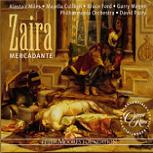Somehow I’m certain that if Opera Rara had deemed all of Mercadante’s 1831 opera Zaira to as be worthy as these highlights, the Peter Moores Foundation, which funds its recordings, would have found the money to record it. The opera succeeded at its premiere but did not hold the stage for long; Bellini had set the libretto two years before and it failed. The conflict is amorous as well as religious: Orosmane (bass), the Muslim sultan of Jerusalem, is in love with his slave, Zaira (soprano) and vice-versa. When one of Orosmane’s prisoners, Nerestano (tenor), returns, he and Zaira seem attracted to one another and Orosmane becomes jealous. It turns out that in fact Zaira and Nerestano are brother and sister, the children of Lusignano (baritone), a former King of Jerusalem. When Zaira discovers this, she must decide whether to remain a Muslim, as she has been brought up under Orosmane, or return to her Christian roots. At the opera’s close, Orosmane kills Zaira out of jealousy; as she dies she refers to Nerestano as “brother”, and Orosmane, realizing what he has done, kills himself.
Besides a moment of writing for tenor that sounds exactly like Bellini (“Prendi, l’anel ti dono” from Sonnambula, to be specific), Mercadante has very much his own voice. Tempos change unexpectedly and effectively within set pieces to add to dramatic effect; Zaira, in an extended aria, faints, and being revived, sings a cabaletta that grows and grows in intensity; a grand scene for bass is remarkably florid and features an obbligato clarinet. But above all, the music, at least this 75-minute set of highlights, is terrific–exciting, varied, and expressive, well-scored, and written for voices schooled in bel canto.
This performance is ideally cast. Majella Cullagh’s soprano has grown richer in the last few years and the middle of her voice is now as impressive and appealing as the top; her agility is remarkable and she wrings whatever emotion she can out of the character and situations. The same can be said of bass Alastair Miles, who dazzles with coloratura in his opening scene and remains imposing throughout. Bruce Ford’s responsive, supple, big-boned tenor continues to amaze for both its range and fluidity, and Garry Magee, with less to do, impresses nonetheless as Lusignano.
David Parry again proves himself a superb opera conductor and master of bel canto. Works of this period easily can fall into a rum-tum-tum sameness, but Parry finds the unusual and original and makes it work. The orchestra and chorus are excellent. Add to this Opera Rara’s usual scrupulous notes–both entertaining and informative–and clean, clear sound, and this is a winner. If you love Rossini, Bellini, and Donizetti, this will drive you wild with joy.
































